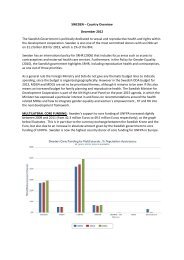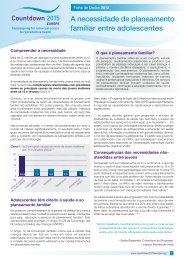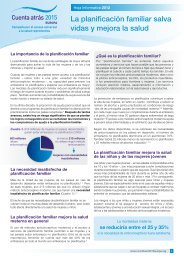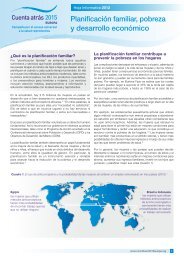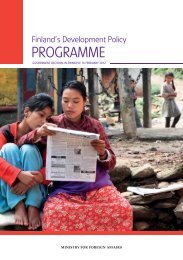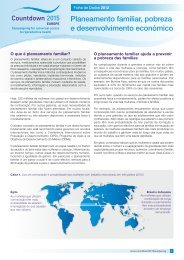The Unmet Need for Family Planning - Countdown 2015 Europe
The Unmet Need for Family Planning - Countdown 2015 Europe
The Unmet Need for Family Planning - Countdown 2015 Europe
You also want an ePaper? Increase the reach of your titles
YUMPU automatically turns print PDFs into web optimized ePapers that Google loves.
Everyone laughs at the remark, but it’s all too common that theycan’t access condoms. We have to include men in our plans toaddress unmet need, too.”– Nana Amma O<strong>for</strong>iwaa Sam,Advocacy Officer, Planned Parenthood Association of GhanaStock-outs of supplies are common“In a hospital in northern Uganda, we experienced stockoutsof contraceptives: condoms, injectables (which is themost common method) and implants. We only had pills, sothe method mix wasn’t there. If a woman is on injectables andwe only have pills, the woman just leaves with no protection.Though there is a wide belief in some circles that pills areconvenient, in Ghana this is not always the case. It’s difficultto disguise if you have to take a pill every day, but if you walkthe distance to get injections only every three months, yourhusband doesn’t know.”– Dr. Moses Muwonge, M.D., Health Logistics Consultant, Uganda“In 1995 and1996 I was working in a conflict area, and therewere stock-outs of contraceptives. <strong>The</strong> women would comein the evening and then return home in the morning, as mostfamilies would sleep on the streets in the cities where it wassafer than the villages … Women wanted family planning butcouldn’t get it. <strong>The</strong> stock-out was at country level, yet othermedicines were coming through despite the conflict.”– Dr. Moses Muwonge, M.D., Health Logistics Consultant, Uganda“We spoke with a doctor who is responsible <strong>for</strong> reproductivehealth programmes in Mexico’s third largest state. She wasvery worried because her state simply does not have thecontraceptives that women need. We looked into this and foundthat, although her state received an allotted amount of moneyspecifically <strong>for</strong> contraceptives, it never reached her office. Aftera great deal of investigation it became clear that there is a lawrequiring budget integrity and transparency on the part of thecentral government, but it does not apply at state level. Asa result, the Minister of Health has documentation showingthat the Government is investing funds in family planning andsupplies, and it looks like a great success. But you discover thetruth when you go to the states, where contraceptive suppliesare needed and there isn’t sufficient funding <strong>for</strong> them.Although at central level the Ministry of Health disburses funds<strong>for</strong> family planning, the money is received at state level by theMinistry of Finance rather than Health. Once funds reach thestates, the governors can decide where that money goes: itcan decide there are more important priorities than reproductivehealth and family planning. MEXFAM is now advocating tochange this.”– Esperanza Delgado,Director of In<strong>for</strong>mation and Evaluation, MEXFAM“We started seeing stock-outs of contraceptive supplies. <strong>The</strong>reis a specific labelled budget line <strong>for</strong> family planning, so we wentto the central Government and asked why there were stockouts. <strong>The</strong>y said they did not know. In Mexico, the decentralizedsystem means that all 32 states have to follow the model setat the central level, yet this is not the case with regard to thebudget.”– Esperanza Delgado,Director of In<strong>for</strong>mation and Evaluation, MEXFAMContraceptives are expensive <strong>for</strong> many users andorganizations“<strong>The</strong> <strong>Family</strong> <strong>Planning</strong> Association of the Philippines has 25chapters, all of which are clinics providing services, such ascounselling, as well as contraceptives. However, we still seekdonations <strong>for</strong> our commodities because we have to recover thecosts. Although the contraceptives we get from IPPF are free,when the shipments arrive in the Philippines we have to paytaxes on them of around 12%. For us to be exempt from payingthese taxes, we have to be included in the law that mandatessuch exemption, but we’re not.”– Bryant Gonzales,Youth Coordinator, <strong>Family</strong> <strong>Planning</strong> Association of the Philippines“We’ve talked about price with people, and frankly people prefercontraceptives to be free. However, they don’t have much faithin what’s being provided <strong>for</strong> free by governments. For example,at a Q&A session with adolescents, we were talking aboutmyths and misconceptions, and one thing that came out wasthat government-provided male condoms often break. This isbecause they aren’t stored properly or were expired. <strong>The</strong>seare some of the things we’ve heard from young people, andreasons why, even where governments are providing servicesand supplies, there is less reliance on these sources. Inaddition, there are no good storage facilities within governmentinstitutions, so there is this feeling that the government-providedcontraceptives are not good products that people can usewith faith. As a result, there’s always a dependence on privateproviders, getting it from the chemists or pharmacy, which ismuch easier, but there is still limited choice.”– Sarita Barpanda,Country Programme Advisor, Interact Worldwide, IndiaPeople know about family planning, but can’t get thesupplies and services they need“I believe in family planning. I believe in all of the benefits thatfamily planning provides to individuals and communities and inpolitical life. Just because a country ‘develops’ economicallydoes not mean that it does not require funding and programmes<strong>for</strong> family planning. It just requires these in a different way.<strong>Family</strong> planning is a never-ending story.”– Esperanza Delgado,Director of In<strong>for</strong>mation and Evaluation, MEXFAM“In my experience at community level, working with men andwomen, separately and collectively as couples, there wasminimal resistance but a lot of curiosity. I don’t question thedemographics that say knowledge of family planning is at 96%.People know about the pill and other methods, they may havemisunderstandings, but the big problem is they can’t access it.”– Holo Hochanda, Zambian Commission on Population andDevelopment delegation, BroadReach Healthcare, Zambia“One reason why knowledge about family planning is nearlyuniversal is because you have many [civil society organizations(CSOs)] working on this, and you have things like radio stationsthat reach many people. But the reach of the messages is notas good as the reach of the family planning and public healthfacilities. If someone is within 20 kilometres of a village, theyknow about family planning, because CSOs have meetings inthe villages. <strong>The</strong> question is, once I have the knowledge, wherecan I access the services? That is <strong>for</strong> the public sector. <strong>The</strong>www.countdown<strong>2015</strong>europe.org21







